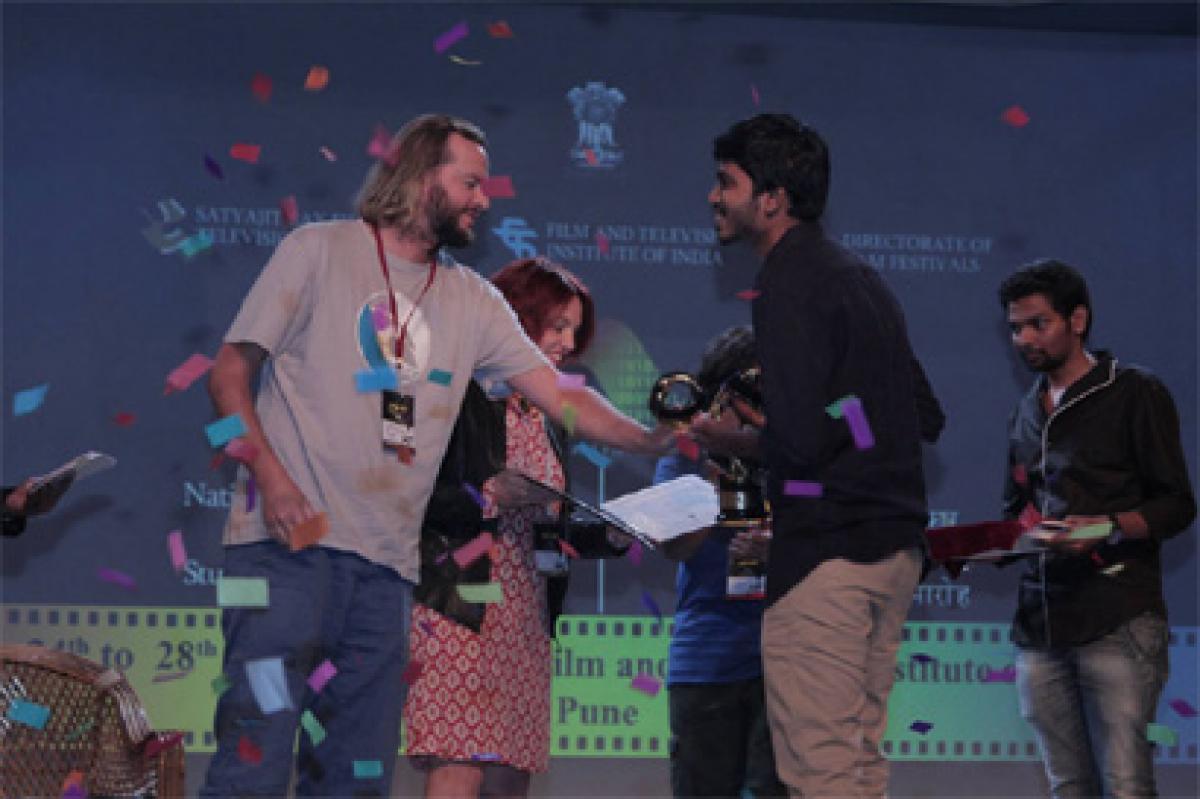Live
- Rana’s wife Miheeka take social media by storm
- Inter-state burglar arrested
- Traffic diversions for ‘Vision’ meet
- YSRCP stir for MSP today
- Direct flights from Rajahmundry to major cities soon
- Search intensified for Gowtham Reddy as HC dismisses his bail plea
- Santosh Trophy final round to begin in Hyderabad tomorrow
- BGT: Rohit must return to opening for Brisbane Test, says Ponting
- Swimming sensation Havya steals the show
- NDTL gets WADA nod to manage Athlete Biological Passport
Just In

As the morning tide of the Arabian Sea rise in a Kutchi village in Gujarat, Ahmedbhai, one of the protagonists of the documentary \"Shifting Tides\", leads his herd of camels as they swim from one mangrove island to another.
As the morning tide of the Arabian Sea rise in a Kutchi village in Gujarat, Ahmedbhai, one of the protagonists of the documentary "Shifting Tides", leads his herd of camels as they swim from one mangrove island to another.
The Kharai camels of Gujarat, which have adapted to the extreme climate of the Rann, are the world's only camel species able to swim.
The documentary "Shifting Tides" by Aakash Doshi which was selected for screening at the recently held Bangalore International Film Festival (BIFFES) and the Mumbai International Film Festival, 2016 (MIFF), beautifully captures the change that urbanisation and industrialisation around Kutch has brought about on the lives of the Unt Maldhari people who have been traditionally living off these mangrove-eating species of camels.
The revolving windmills and factories create the backdrop for the village where Ahmedbhai and Ismailbhai live with their families. The film follows Ahmedbhai and Ismailbhai who are a few of the remaining Unt Maldharis continuing their forefathers' business as the caretakers of the Kharai camels.
The bond that they share with the camels goes back almost seven generations.
"This film explores the duality between Unt Maldharis and the onslaught of change, which has affected their livelihood, and unique traditional knowledge that is on the verge of vanishing," Doshi, who made the film as part of his final year project while pursuing his postgraduate diploma in Bangalore-based Srishti Institute of Art, Design and Technology in 2014, told IANS over the phone.
For an ordinary observer, it may be difficult to distinguish the Kharai camels from other camel species. But Doshi informed that they have some distinguishing physical features.
"In comparison to the regular camels, the Kharai camels are smaller in height. The constitution of their legs is also different from other camels," Doshi said.
"Shifting Tides" has already won many accolades including the prestigious "Best Documentary" award at the National Students Film Awards held at the Film and Television Institute of India ( FTII), Pune, in 2015. The film also earned the best editing award at 2015 Cut.in, an annual national students' film festival held at the Tata Institute of Social Work (TISS), Mumbai.
"In earlier days, the Kharai camels were used for transportation, but now the Maldhari community earn their living by selling camel milk which is being marketed as healthy for people suffering from diabetes and several other ailments," Doshi said.
What is interesting to note, Doshi said, is that these animals have tied the Muslim (Jat) people who actually rear the camels with the Hindu (Rabari) community who own the camels with a bond of love and understanding for generations.
"There is actually no strict ownership system. They work on a trusteeship model," the young filmmaker who thanked Shristi Films, a centre of Srishti Institute of Art, Design and Technology, for helping him follow his dreams.
Srishti Films, headed by noted environmental filmmaker Sanjay Barnela, offers its students a unique model of film-making.
"It follows a unique model of earning revenues through commissioned projects and then subsidising the student films, thus allowing them the liberty to work on issues in farflung areas such as Kutch, Malkangiri and Nagaland," Barnela explained.
Assisting Doshi with the camera while filming "Shifting Tides" was Naomi Shah, who herself went on to make another award-winning documentary "Alpajeevi" that drew comparisons between a grand but dilapidated bungalow in a bustling town, with that of a 'jhopdu' (a temporary shelter) in the harsh landscape of the Rann.
"Alpajeevi" won the silver trophy for best documentary at 2015 Cut.in and was also screened at 2016 Bangalore International Film Festival (BIFFES) and the Mumbai International Film Festival, 2016 (MIFF).
"The present batch of Srishti Film students is producing a set of films on "human-wildlife conflict" in remote Fakim wildlife sanctuary near the Indo-Burma border," Barnela pointed out.

© 2024 Hyderabad Media House Limited/The Hans India. All rights reserved. Powered by hocalwire.com







